
Karl J Sherlock
Associate Professor, English
Email: karl.sherlock@gcccd.edu
Phone: 619-644-7871
 TOPICS ON THIS PAGE
TOPICS ON THIS PAGEStudy the sentence types in this section, including any punctuation discussed with them. Then, complete this exercise: Punctuation: Commas.
While sentence moods identify motive and tone, Sentence Types classify the overall system that a sentence represents. Parts of speech have a direct relationship to how those systems form, how they compound, and how they complicate sentence structure. By "systems,"we mean the way you gather sentence elements into phrases and clauses.
A PHRASE is a group of two or more words that come together to express a smaller idea adding more detail to a larger idea, but it always lacks a subject and a predicate (i.e., a main verb). For instance,
The example above can't stand alone as a complete sentence, or even a subordinate clause, because it does not have a subject and predicate. It does have words that, at first glance, may seem like they could fit these roles. Words like "friends" and "subway" are nouns that seem as if they could play the subject and object of a sentence, but on closer inspection they're already busy doing other things: friends is the object of the preposition "of" and "subway" is the object of the preposition "on." "Riding" kinda, sorta sounds like it could be a verb. (After all, these friends rode the subway together, didn't they?) However, the word "riding" is not a verb; rather, it's a verbal: a word that is verb-like, but is actually a different part of speech. This one happens to be a participle, a kind of adjective that derives from the progressive and perfect tenses of verbs. Both, prepositions and participles, are words used on their own or with other words to express a smaller idea describing a larger one. This, by definition, makes them phrases. Phrases are often named for their dominant part of speech:
A CLAUSE is a larger system of expression than a phrase, and is more complete for the simple fact that it always has, both, a subject and a predicate. (Remember that Imperative Sentences have an implied subject, "You.")
The most basic form of sentence is the simple sentence, containing one, and only one, main clause (an independent clause):

Conjunctions do occur in simple sentence, but only to connect compound elements (e.g., compound modifiers or compound predicate objects). Some students misidentify long simple sentences as complex, or even compound, because they have a succession of phrases. However, always be aware that prepositional phrases, adverb phrases, and noun phrases do not determine a sentence's degree of complexity; only clauses do.
The exception to this rule is a noun clause, with which the entire clause serves the role of a single subject or object:
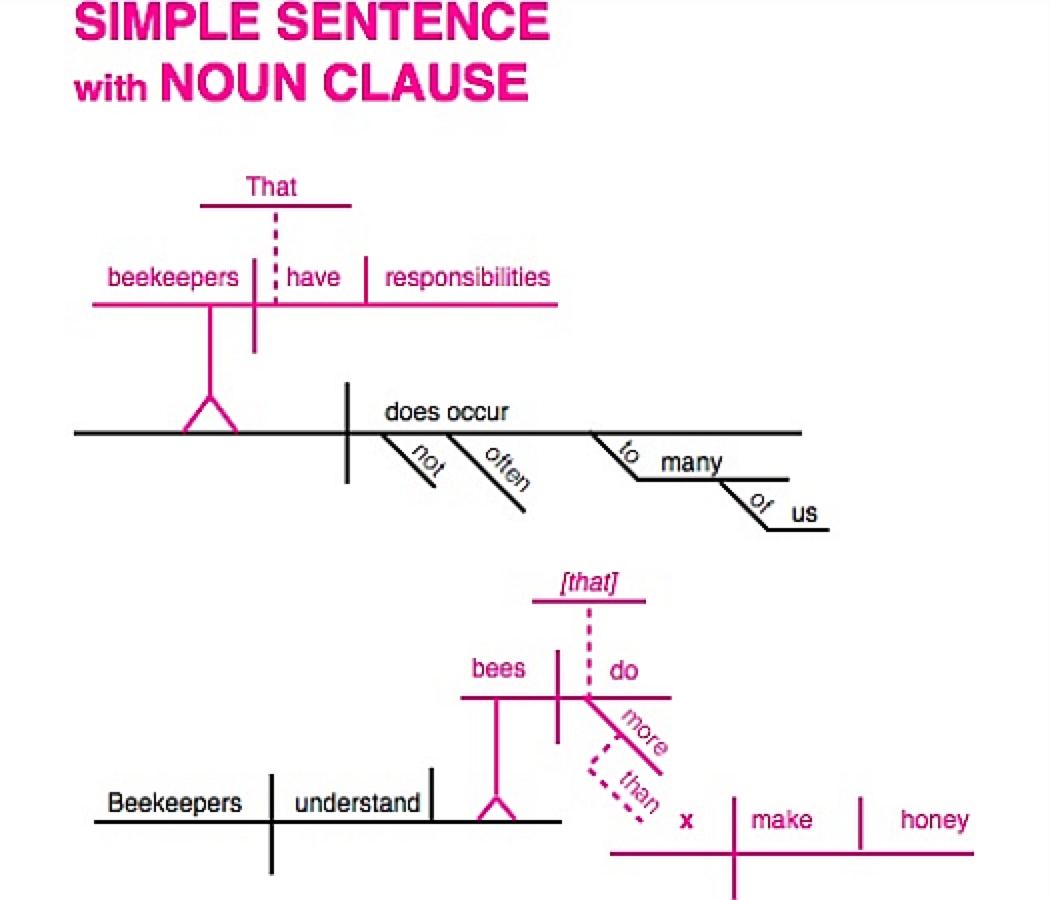
Both of these examples have one main verb but, in each, an entire clause serves the role of a noun. In the first, the noun clause is the subject of the sentence: the clause in its entirety answers the question, "WHAT doesn't occur to us?" In the second example, the noun clause is the object of the transitive verb "understand": the clause in its entirety answers the question, "WHAT do beekeepers understand?" These questions prove that the clauses are nouns, because a noun always answers the question "What?" However, neither of these noun clauses makes the sentence any more complex than an appositive phrase would, and this is why noun clauses are the exception to the rule of simple sentences.
Nouns: Noun Clauses
Adjectives: Adjective Clauses
Adverbs: Adverb Phrases
Adverbs: Conjunctive Adverbs
A simple sentence is "complicated" by the addition of one or more subordinate clauses (a.k.a. dependent clauses).
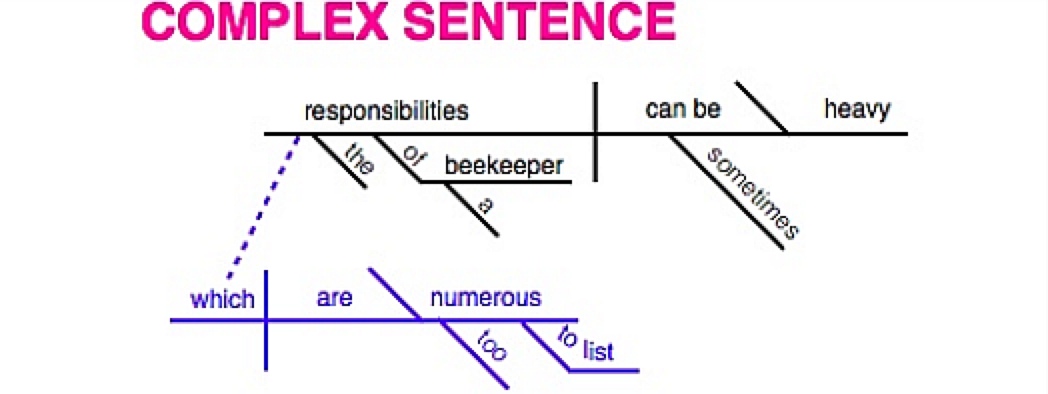
Subordinate clauses either modify, as in adjective and adverb clauses, or they relate to a part or the whole of a main clause, as in relative clauses.
Conjunctions: Conjunctions: Subordinating
Pronouns: Pronouns: Relative Pronouns
Adjectives: Adjective Clauses
Adverbs: Adverb Phrases and Clauses
When two or more main clauses are connected by a coordinating conjunction or a semi- colon, the sentence becomes compounded. Compound sentences contain NO subordinate clauses--only independent clauses.
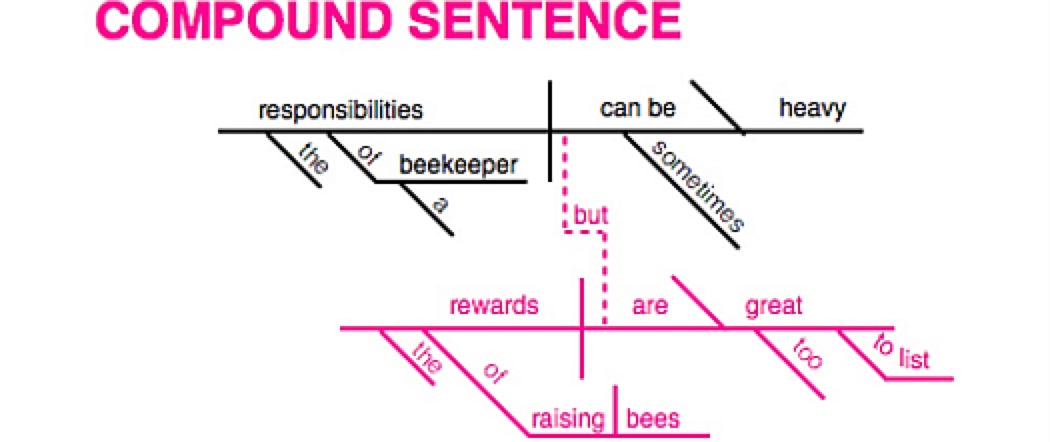
Adverbs: Conjunctive Adverbs
Conjunctions: Conjunctions: Coordinating
Conjunctions: Conjunctions: Correlative
When a compound sentence is complicated by the addition of one or more subordinate clauses, it becomes a compound-complex sentence. This can happen by the joining of a complex sentence with one or more simple sentences, or by the conjoining of two or more complex sentences.
The greatest challenge of writing larger compound-complex sentences is maintaining coherency, so that the sentence doesn't become convoluted or begin to ramble.
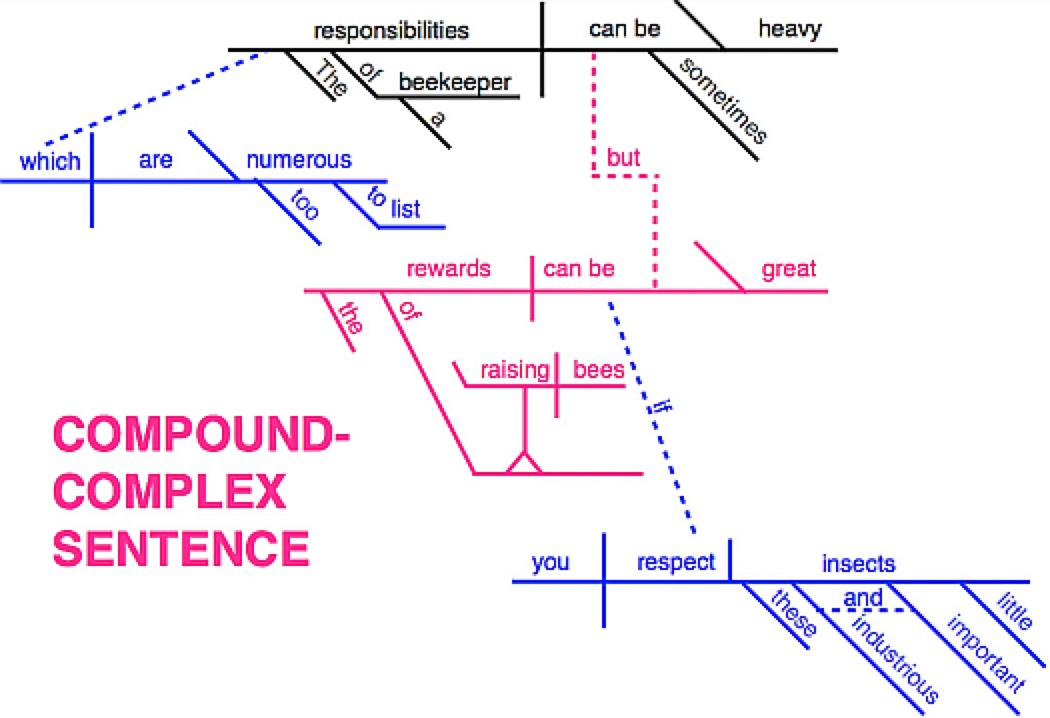
Conjunctions: Conjunctions: Coordinating
Conjunctions: Conjunctions: Correlative
Conjunctions: Conjunctions: Subordinating
Pronouns: Pronouns: Relative Pronouns
Adjectives: Adjective Clauses
Adverbs: Adverb Phrases and Clauses
Quotations are borrowed into sentences either as phrases or as clauses. When they are phrases, of course, they don't change the complexity of the sentence. However, when they are clauses, what then?
In the vast majority of cases, quotations are Noun Clauses.
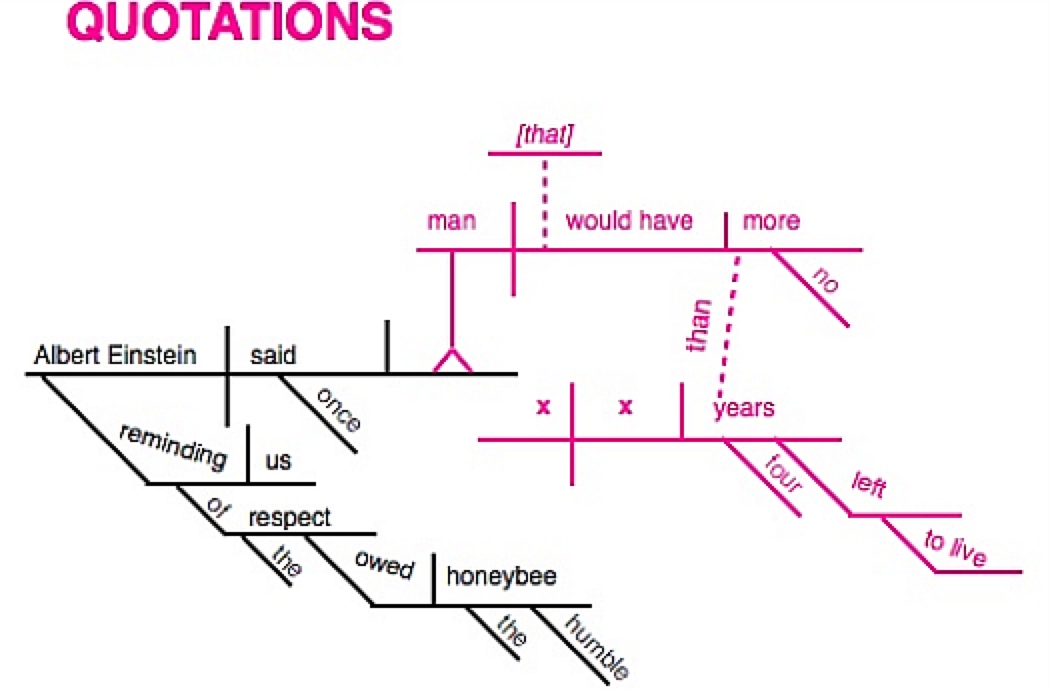
The entire statement appearing between quotation marks answers the question, "What did Einstein say?" Answers to the question "What?" are nouns. This noun has, both, a subject and a predicate, which makes it, by definition, a clause; hence, it is a noun clause posing as the object of the transitive verb "say." That's not the same as a subordinate clause, though. In fact, notice that the sentence in the diagram above is a simple sentence, for it has one, and only one, main clause.
This isn't to say that other sentence types can't contain quotations like this. Of course they can. The point is merely this: a quotation is a sentence element, hosted inside a clause, regardless of whether the quote is a phrase or a clause, itself.
Nouns: Noun Clauses
Nouns: Showcased Nouns
Sentences: Sentence Moods: Mixed Moods: Quotations
Karl J Sherlock
Associate Professor, English
Email: karl.sherlock@gcccd.edu
Phone: 619-644-7871